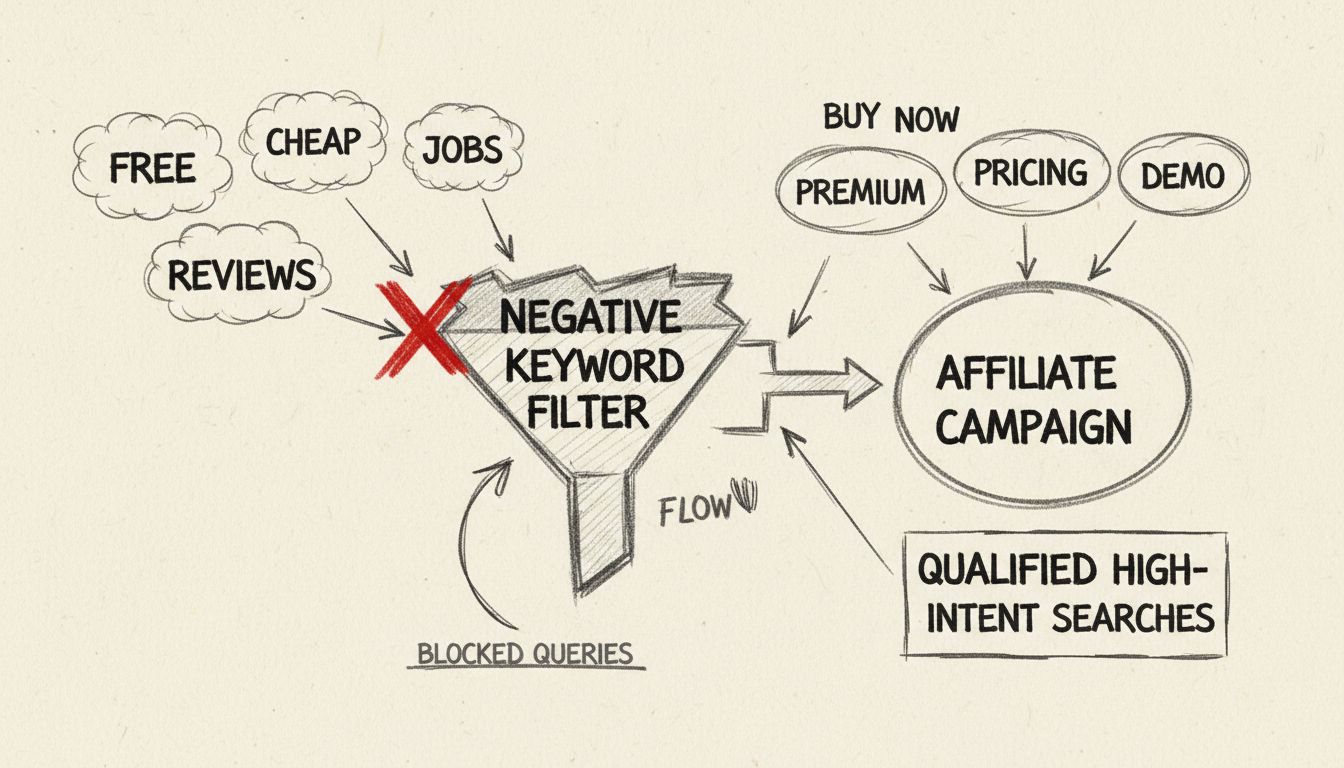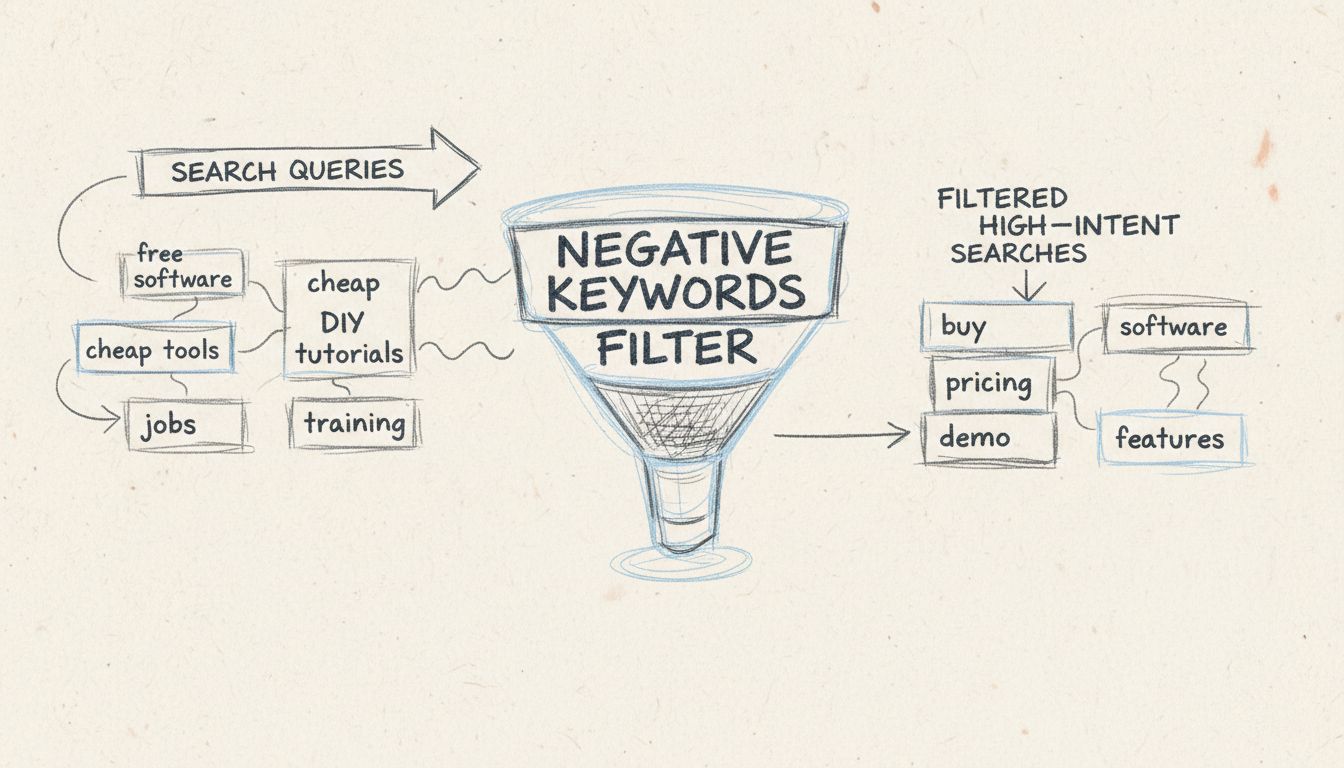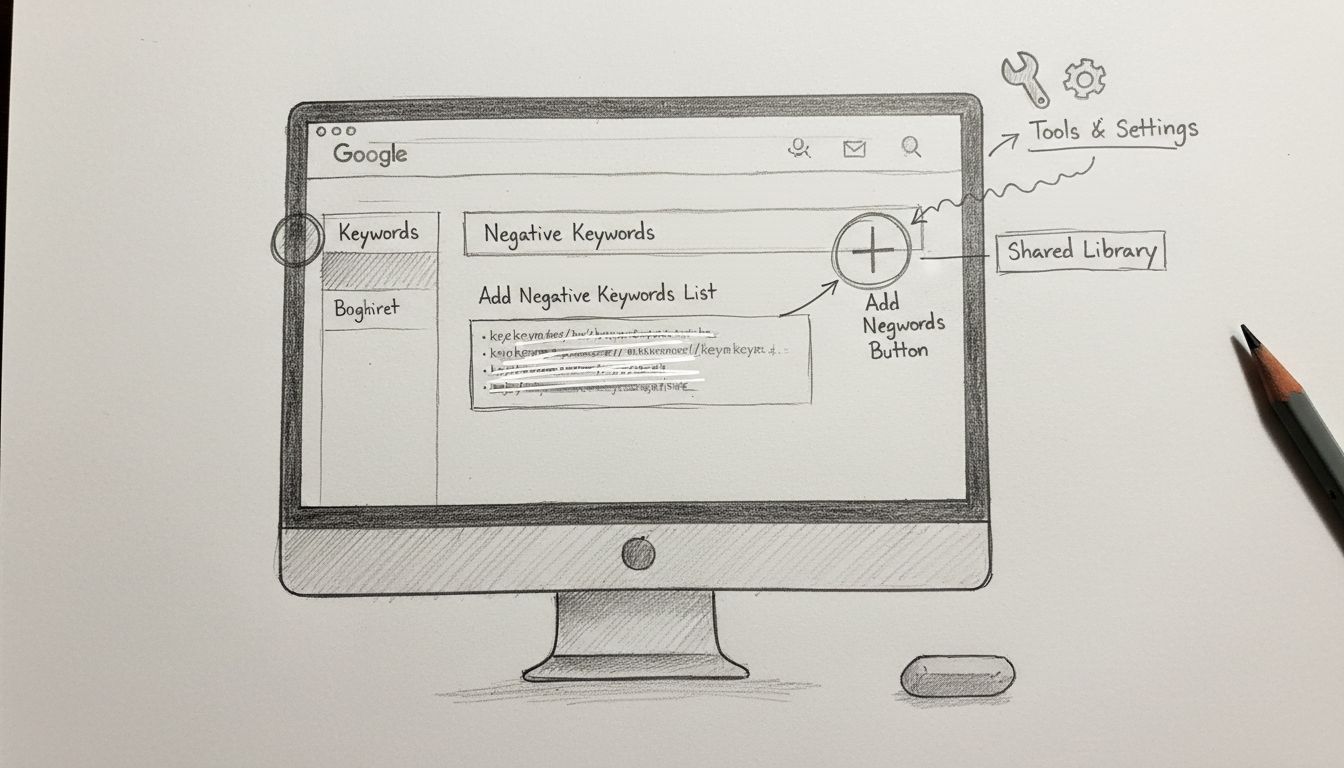
How Do Negative Keywords Improve Affiliate Marketing Campaigns?
Learn how negative keywords reduce wasted ad spend, improve Quality Scores, and boost conversion rates in affiliate marketing campaigns. Complete guide with str...
Negative keywords are terms used to prevent ads from appearing in irrelevant searches, helping advertisers save money and improve campaign performance.
Negative keywords are a pivotal element in digital advertising strategies, particularly on platforms like Google Ads. They allow advertisers to refine their campaigns by ensuring that ads are not shown for irrelevant search terms. This not only conserves advertising budgets but also enhances the overall efficacy of campaigns by enabling a more precise targeting of the intended audience. In affiliate marketing and the use of affiliate software, understanding negative keywords is vital to optimizing the efficiency and return on investment (ROI) of marketing endeavors.
Negative keywords are specific words or phrases that prevent an ad from being triggered by a search query. Adding negative keywords to campaigns ensures that ads do not appear for searches irrelevant to a product or service, thereby avoiding unnecessary clicks and focusing advertising spend on more qualified leads.
Negative keywords help save money by avoiding clicks from users unlikely to convert. By filtering out unwanted traffic, advertisers can allocate their budgets to audiences more likely to engage or make purchases.
By using negative keywords, ad relevance is enhanced. Excluding terms that do not align with offerings increases the chances of ads being shown to users genuinely interested in the products or services.
Ensuring that ads are shown only for relevant queries can increase CTR. A higher CTR indicates that ads are more appealing to the audience they are displayed to, potentially improving the Quality Score in Google Ads.
Negative keywords help filter out non-converting traffic, contributing to higher conversion rates. This means more users who click on ads are likely to perform desired actions, such as making a purchase or signing up for a service.
Negative keywords also protect brand image by ensuring ads are not associated with unrelated or potentially harmful search terms.
Negative keyword match types determine how closely a search query must match a negative keyword before an ad is blocked from appearing. Understanding these types is crucial for effectively managing negative keywords in campaigns.
This default match type for negative keywords prevents ads from appearing if the search query contains all negative keyword terms, regardless of order. However, if the search includes only some of the terms, the ad may still show.
Negative phrase match keywords prevent ads from showing if the search query includes the exact keyword phrase in the specified order. Additional words can be present in the search query, but the phrase itself must be in the same order for the ad to be blocked.
Negative exact match keywords prevent ads from appearing if the search query matches the negative keyword phrase exactly, with no additional words or variations.
Negative keywords can be applied at both the campaign and ad group levels. Campaign-level negative keywords affect all ads within a campaign, while ad group-level keywords are more specific, allowing finer control over which ads are shown for which queries.
For a broader approach, negative keywords can also be applied at the account level, affecting all campaigns within the account. This is useful for excluding terms universally irrelevant across all campaigns.
Negative keyword lists allow for the organization and management of negative keywords more efficiently. By creating lists, a set of negative keywords can be applied to multiple campaigns or ad groups, ensuring consistency and saving time.
Tools like Google Ads’ search term report and third-party keyword research tools can help identify potential negative keywords by showing which terms are triggering ads. This information is valuable for refining a negative keyword list.
Analyzing competitors’ keyword strategies can provide insights into keywords that might be irrelevant or harmful to campaigns, aiding in building a robust negative keyword list.
Conducting manual searches on Google can reveal unrelated terms that may need to be excluded. Observing search results for main keywords can help identify irrelevant terms.
While negative keywords are beneficial, overusing them can limit reach and reduce ad visibility. It’s important to strike a balance to ensure valuable traffic is not unintentionally excluded.
Negative keywords require regular monitoring and updates. As market trends and consumer behavior change, so should the negative keyword list to ensure continued relevance and effectiveness.

Paid Media Pros August 15, 2022
Knowing how to effectively use tools like Google Ads can significantly enhance your marketing strategy. One crucial component is the use of negative keywords. Understanding and implementing negative keywords can ensure that your marketing campaigns focus strictly on high-intent and relevant search queries, thereby maximizing your return on investment.
Negative keywords are instrumental in excluding search terms that aren’t relevant to your business, allowing you to focus solely on keywords that matter to your customers. This ensures that your ads are shown only for searches that align with your business goals. By filtering out low-quality searches, negative keywords help optimize your campaign’s performance.
Negative keywords come with different match types: broad, phrase, and exact. These match types determine how strictly a search term must match your negative keyword to be excluded.
Consider you’re an affiliate marketer promoting eyeglasses. While targeting “glasses,” you might inadvertently appear in searches for “wine glasses” or “drinking glasses.” By adding “wine” and “drinking” as negative keywords, you ensure that your ads are shown only for searches related to eyeglasses.
To apply negative keywords effectively, you can add them directly to campaigns or ad groups or create a negative keyword list for easier management across multiple campaigns. This flexibility allows you to tailor your approach based on specific campaign needs.
Harnessing the power of negative keywords can significantly enhance your affiliate marketing campaigns . By filtering out irrelevant searches, you ensure that your ads are seen by the right audience, leading to higher conversion rates and better ROI. Ready to optimize your campaigns? Start implementing negative keywords today to see the difference they can make in your marketing efforts.
You can add negative keywords through the “Keyword” settings on your Google Ads account.
Negative keywords are not always an exact match. You can add negative keywords as broad, phrase, or exact match.
Negative keywords help to ensure that your ad is not shown to people who are not interested in what you are selling. By adding negative keywords to your ad, you can help to increase its relevance and improve your chances of getting clicks from potential customers.
Negative keywords are terms that prevent your ads from showing in unrelated search queries.
They help you focus on high-intent searches, reducing wasted spend on irrelevant clicks.
Broad match excludes searches with all terms present, phrase match requires terms in order, and exact match excludes only exact terms.
Yes, by creating a negative keyword list, you can apply them across multiple campaigns efficiently.
Transform your affiliate marketing strategy by mastering negative keyword management. Get started with Google Ads today and watch your conversions soar!

Learn how negative keywords reduce wasted ad spend, improve Quality Scores, and boost conversion rates in affiliate marketing campaigns. Complete guide with str...

Learn what negative keywords are and how to use them to prevent ads from showing on irrelevant searches. Master negative keyword match types, implementation str...

Learn how to add negative keywords in Google Ads to reduce wasted ad spend, improve targeting, and boost ROI. Step-by-step guide with match types and best pract...
Cookie Consent
We use cookies to enhance your browsing experience and analyze our traffic. See our privacy policy.